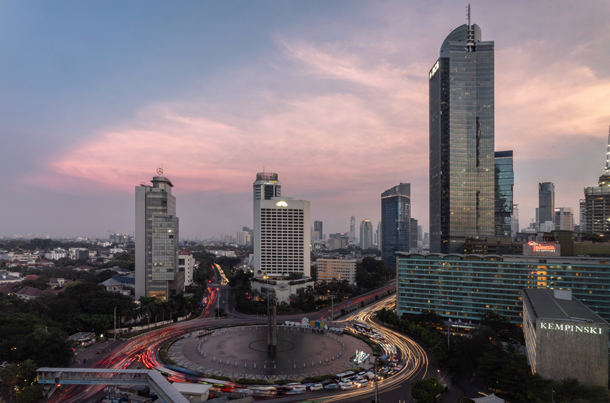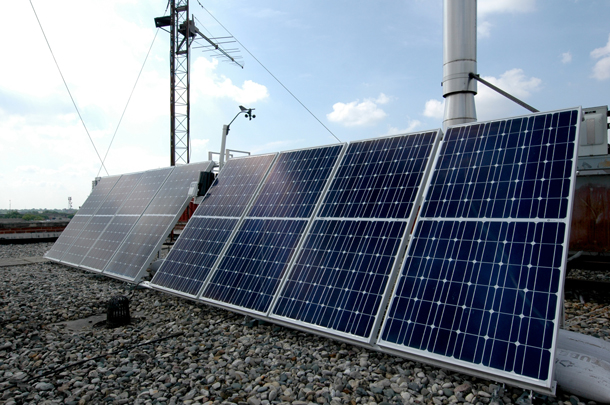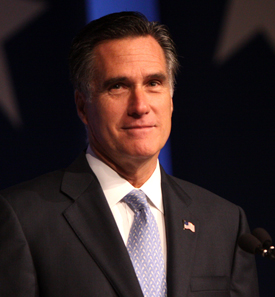Beyond the Headlines
Air Date: Week of May 3, 2019

The Indonesian capital of Jakarta, which is home to 10 million people, is sinking, causing the government to consider relocating to higher ground. (Photo: Jakarta, Indonesia, Gordon, Flickr, CC BY-NC-ND 2.0)
Looking beyond the headlines, Peter Dykstra takes Host Steve Curwood to the sinking Indonesian capital of Jakarta. The city has been plagued by subsidence and groundwater depletion, prompting the government to consider relocating to a safer, drier place. They then discuss the green jobs market and its promise to deliver higher wages and lower entry barriers, and conclude with a history calendar note on Utah Senator Mitt Romney. 15 years ago, as Governor of Massachusetts, Mr. Romney signed a groundbreaking Climate Action Plan, but shifted his beliefs on climate change after entering the 2012 presidential race.
Transcript
CURWOOD: It’s Living on Earth, I’m Steve Curwood.
Time now for us to take a look beyond the headlines. And for this journey, we travel to Atlanta, Georgia to talk with Peter Dykstra. He is an editor with Environmental Health News, that's EHN.org and DailyClimate.org. And on the line, hey there, Peter, what's going on?
DYKSTRA: Hi, Steve. You know, one of the world's great cities is sinking. Jakarta is home to 10 million people, it's Indonesia's capital. It's a major victim of subsidence. That's where marshy land forces whatever is built on top of it to literally sink. The other problem with Jakarta and those 10 million people - 10 million thirsty people - is that they're drawing down groundwater, which aggravates the subsidence problem even more. Add sea level rise to the mix, and it's prompted the Indonesian government to look into moving its capital.
CURWOOD: Okay, they could move the capital, but what about the 10 million other people?
DYKSTRA: Well, that's why they're not going to move the 10 million people, they're only going to move the people and the buildings associated with running the Indonesian government. They'll move them to a safer location, and Indonesia's planning minister said it's no surprise. They've known this for decades, it's bound to happen. They say that moving the government will also help alleviate pollution and traffic, and however many of the 10 million remain.
CURWOOD: I mean, if the government folks can get out of town and avoid getting flooded out, it still leaves the ordinary folks there.
DYKSTRA: Well, they have our thoughts and prayers.
CURWOOD: [LAUGHS] Okay. Hey, what else do you have for us today?
DYKSTRA: Well there's a report out from the Brookings Institution about the green jobs economy, the clean energy economy that lies in our future. The Green New Deal didn't pass in Congress this time around, but it's really helped push up the dialogue about it. The green jobs economy promises, according to Brookings, that there'll be better paying jobs that'll be easier for many people to access, but it won't be an ideal new deal.

According to a new analysis by Brookings, the green jobs economy promises higher wages and lower entry barriers. (Photo: Solar Panels on Everitt, shantontcady, Flickr, CC BY-ND 2.0)
CURWOOD: What's un-ideal about it?
DYKSTRA: What's un-ideal is that a lot of these jobs have tended so far to be focused toward whites and men. And the diversity aspect of it isn't that strong. But the economic aspect of it promises a $5 to $10 premium, according to Brookings, in what these jobs pay, not just in clean energy, but also energy efficiency, and then the planning and management aspects of both of those things.
CURWOOD: Five to 10 bucks more an hour really matters. All right, well let's look back now in history. What would you like to talk about today?
DYKSTRA: Coming up on the 15th anniversary, May 7, 2004, Massachusetts Governor - this is up by you guys - Mitt Romney spearheaded something called the Climate Action Plan. It was groundbreaking, not only because no other state had a similarly ambitious climate action plan, but it was spearheaded by a Republican.
CURWOOD: Yeah, but you know, just about when he was going to finish his term, he didn't quite sign what's known as the Regional Greenhouse Gas Initiative. Some said it was because he had his eyes on another job.

As Republican Governor of Massachusetts, Mitt Romney spearheaded a groundbreaking Climate Action Plan. He changed his tune just before entering the 2012 presidential race. (Photo: Mitt Romney 2011, Gage Skidmore, Wikimedia Commons, CC BY-SA 2.0)
DYKSTRA: Yeah, he left that to his successor, a Democrat named Deval Patrick, to sign for Massachusetts. And Mitt Romney, when he got to the 2012 presidential election, when he ran against Barack Obama, by that time, he was expressing doubt about climate change, just like a whole lot of other Republicans made a U-turn on the issue. Now he's a Republican senator from Utah. So we shall see how it all works out for Senator Romney.
CURWOOD: Thanks, Peter. Peter Dykstra is an editor with Environmental Health News, that's EHN.org, and DailyClimate.org. We'll talk to you again real soon.
DYKSTRA: All right, Steve, thanks a lot. Talk to you soon.
CURWOOD: And there's more on these stories at our website, loe.org.
Links
BBC | “Indonesia's planning minister announces capital city move”
LA Times | “Mitt Romney worked to combat climate change as governor”
CityLab | “A Bottom-Line Case for the Green New Deal: The Jobs Pay More”
Living on Earth wants to hear from you!
Living on Earth
62 Calef Highway, Suite 212
Lee, NH 03861
Telephone: 617-287-4121
E-mail: comments@loe.org
Newsletter [Click here]
Donate to Living on Earth!
Living on Earth is an independent media program and relies entirely on contributions from listeners and institutions supporting public service. Please donate now to preserve an independent environmental voice.
NewsletterLiving on Earth offers a weekly delivery of the show's rundown to your mailbox. Sign up for our newsletter today!
 Sailors For The Sea: Be the change you want to sea.
Sailors For The Sea: Be the change you want to sea.
 The Grantham Foundation for the Protection of the Environment: Committed to protecting and improving the health of the global environment.
The Grantham Foundation for the Protection of the Environment: Committed to protecting and improving the health of the global environment.
 Contribute to Living on Earth and receive, as our gift to you, an archival print of one of Mark Seth Lender's extraordinary wildlife photographs. Follow the link to see Mark's current collection of photographs.
Contribute to Living on Earth and receive, as our gift to you, an archival print of one of Mark Seth Lender's extraordinary wildlife photographs. Follow the link to see Mark's current collection of photographs.
 Buy a signed copy of Mark Seth Lender's book Smeagull the Seagull & support Living on Earth
Buy a signed copy of Mark Seth Lender's book Smeagull the Seagull & support Living on Earth

